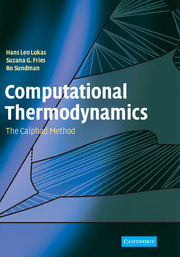Book contents
6 - Assessment methodology
Published online by Cambridge University Press: 03 February 2011
Summary
Starting the assessment
In chapter 5, various models were described in order to understand how they can be fitted to the experimental features that were described in chapter 4. In the present chapter, we start from experimental evidence and search for the model best able to describe it. Therefore many topics of chapter 5 will be revisited here.
An assessor working on a system will experience almost all the steps described and discussed here. Since a system is often reassessed many times, by the same researcher or by another, it is very important to keep records about the decisions made in order to make it easy to restart the work, for example, when new experimental evidence requires a new optimization. The process of assessing a system is made easier if an assessment logbook is kept. An important function of this logbook is that one should record all mistakes and failures so that one does not repeat them later. In the final paper only the sucessful modeling will be reported and there is no information about the difficulties encountered in obtaining it.
The assessment methodology described here includes a critical assessment of the available literature in the way in which it is normally done, for example, in the Journal of Phase Equilibria and Diffusion. By combining this with thermodynamic models, an analytical description is created and the determination of adjustable model parameters is often done using the least-squares method to obtain a description that represents best the complete set of available consistent experimental data.
Information
- Type
- Chapter
- Information
- Computational ThermodynamicsThe Calphad Method, pp. 161 - 202Publisher: Cambridge University PressPrint publication year: 2007
